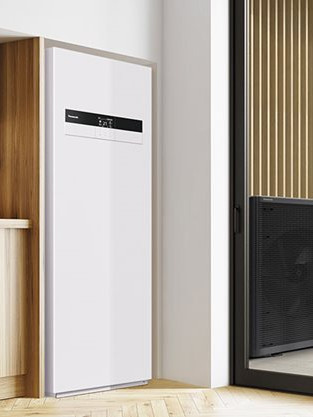A heat pump: always a smart investment or not?


Meeting with Kristof Swerts
Let's start at the beginning: what is a heat pump and how does it work?
A heat pump is an environmentally friendly alternative to the traditional boiler and is used to heat your home or domestic water. Depending on the type of heat pump, it extracts heat from the air, soil or groundwater and releases it into your home using a hot source through a heat exchanger or heat delivery system (underfloor heating, low-temperature radiators, fan coil units). There are four different types of heat pumps: air-to-air heat pump, air-to-water heat pump, geothermal heat pump and hybrid heat pump.
Why choose a heat pump over a condensing boiler?
There are several reasons to choose a heat pump. For one, there is currently already a ban on gas condensing boilers for new construction and subdivisions of 5 units or more. From 2025, a natural gas connection will be generally banned for new construction in Belgium and the electric heat pump will become the norm. So the government is slowly steering us toward sustainable alternatives.
In addition, heat pumps are often chosen to obtain a better EPB score (energy performance and indoor climate). Anyone installing a new building or an IPR (major energy renovation) is required to meet certain requirements. These requirements depend on the project (new construction or renovation) and the date of the building application. The more recent the building application, the stricter the requirements and the more difficult it becomes to meet these requirements without a heat pump.
Another important factor is the price of energy. Everyone remembers the very high energy prices of September 2022. On average, a heat pump consumes 4 times less energy than a traditional heating system. If the energy prices of that time persisted for 1 year, an average family would pay between 7,000 to 8,000 euros for heating (energy costs, heating and household electrical consumption) with traditional heating. With a heat pump, this averaged between 2000 and 2500 euros per year, which is considerably less. We really experienced a rush on heat pumps back then.
If we still want a future on this planet, we must all switch to inexhaustible energy sources.
— Kristof Swerts, Green House advisor for Facq
Is every home suitable for a heat pump?
No, the ideal situation for a heat pump is new construction or a renovation equivalent to new construction. This is because it is imperative to have the lowest possible heat loss. Existing homes that are uninsulated or poorly insulated are less suitable and may require some modifications. Therefore, there is no one-size-fits-all solution for heat pumps. Every home or situation is different.
So inform yourself well and have an official heat loss calculation made in advance. For building applications starting in 2023, this is even mandatory! Without this calculation it is actually impossible to propose a correct heat pump and there is a chance that it will be overdimensioned. As a result, the heat pump will switch on and off too often and will draw peak current more often. And that is exactly what we have been taxed on since this year! Moreover, the heat pump will wear out much faster. If you choose the heat pump too lightly, the back-up electrical resistance will have to step in too often, increasing your consumption. So it is very important that the heat pump is sized correctly.
An official heat loss calculation is very important to ensure that the heat pump functions optimally. For building applications from 2023 onwards, it is now even mandatory.
— Kristof Swerts, Green House advisor for Facq
So are there absolutely no options in smaller renovations?
Yes, in the case of renovations, a hybrid heat pump is an interesting solution. This is a combination of an air-water heat pump and a gas condensing boiler. In a hybrid system, the heat pump and the boiler work together to heat the home and the domestic water. Depending on the outside temperature and the heat demanded, sometimes the heat pump will provide most of the heat, other times the boiler.
Even within hybrid systems, there are several options The choice is best coordinated with the end users so that we design a technically sound installation that meets their needs. The disadvantage of a hybrid heat pump is the high cost price, because you actually buy two systems. This obviously makes the purchase price even higher.
Speaking of costs, what is the average payback period for a heat pump?
The payback period of a heat pump varies widely. In fact, so do prices on the energy market. As mentioned earlier, energy costs were much higher a year ago. In that scenario, a heat pump had an average payback period of 5 years. Purely on the basis of energy consumption, i.e. without taking into account any premiums and discounts on the R.I. Now that the prices have dropped a lot again, the payback time compared to a gas boiler is somewhat higher again. The heat pump also consumes less if free electricity is available from a PV installation. But of course, this installation also has a cost. You see, the payback period is also very situation-dependent. On the other hand, the service life of a heat pump is longer than that of a gas boiler, which makes the investment worthwhile.
Finally, do you see any particular trends or future developments in the field of heat pumps?
I expect that heat pumps will become more and more common, we are already noticing that shift. I myself have been working at Facq as a Green House consultant for 7 years now. Whereas in the first 4 years gas condensing boilers were almost always chosen and almost never a heat pump, nowadays I put both on offer equally often. This is also noticeable in the orders. Energy will only play a bigger role in the future. The population is increasing and the known fossil fuels are getting scarcer. Conventional resources are simply falling short. Whether we like it or not, if we want a future on this planet, we will all have to switch to a clean, inexhaustible source of energy. And right now that source is heat pumps combined with solar panels.
Ask the expert : Kristof's tips
Beware of compatibility
Avoid combining systems that are not suitable for this, such as a heat pump and a fireplace. That way you combine a slow system for heating with a fast system with a lot of power. That's asking for trouble.Ventilate well
Provide a ventilation system, and preferably a type D. Homes that are suitable for heat pumps are usually well to very well insulated, which eliminates natural ventilation. In addition, a D system will recover much of the heat left in the air. This allows you to install a smaller heat pump, which in turn uses less energy.Plan large
Energy-efficient installations often take up a lot of space. Make sure you provide enough space in advance to place all your appliances.Ask us!
I can't stress it enough, but get good advice. Make a no-obligation appointment with your installer at one of our 17 EXPOcenters and present us with your situation. A heat pump is a big investment, so you'd better do it right.Book an appointment